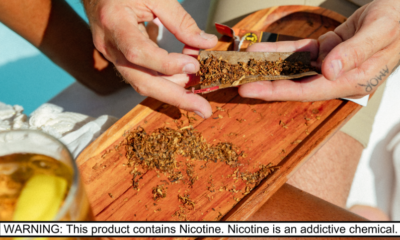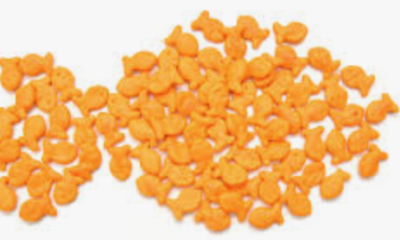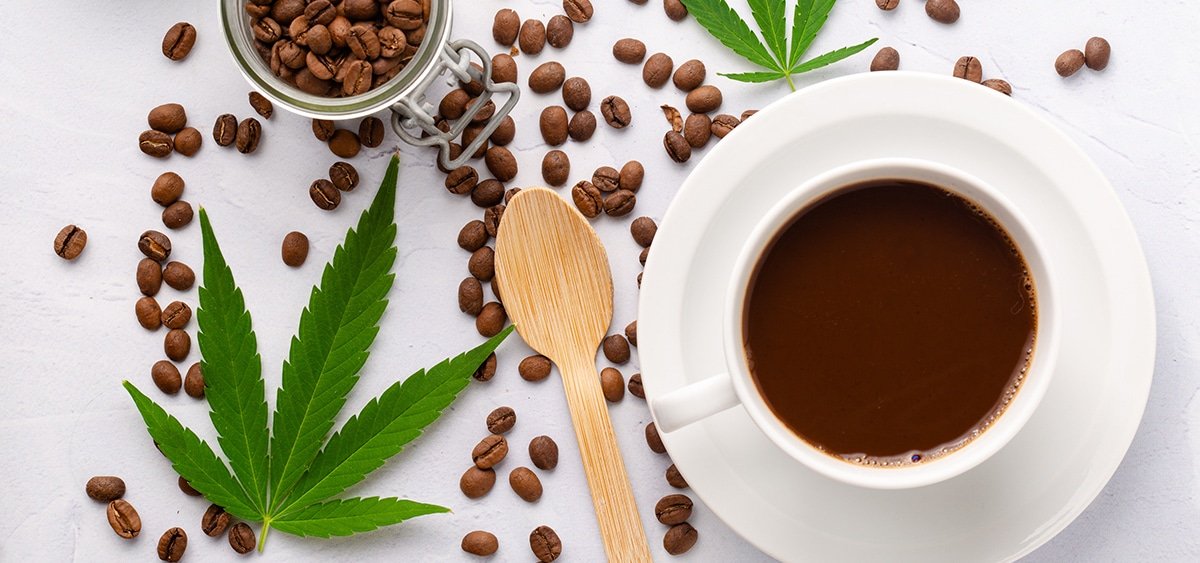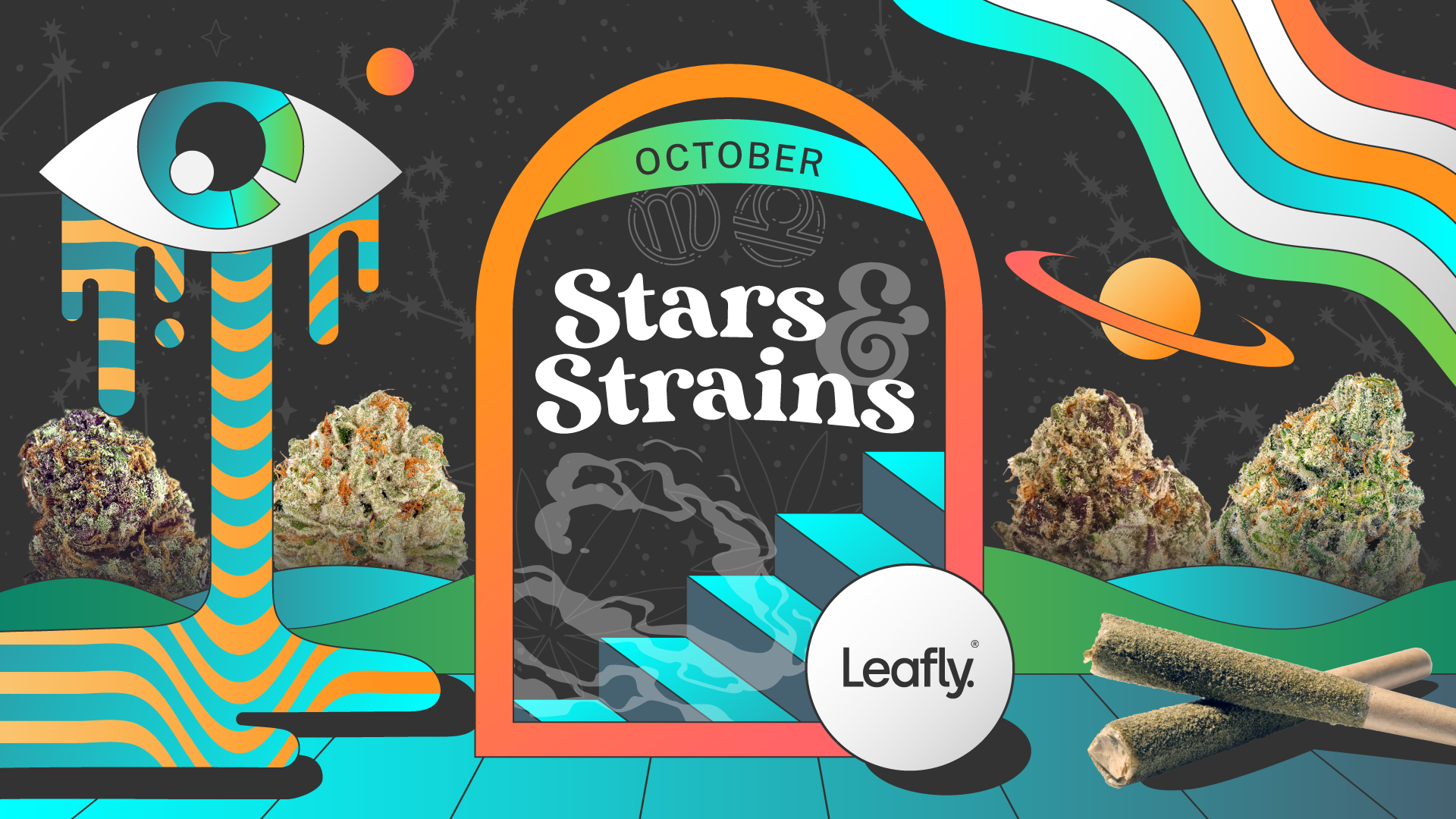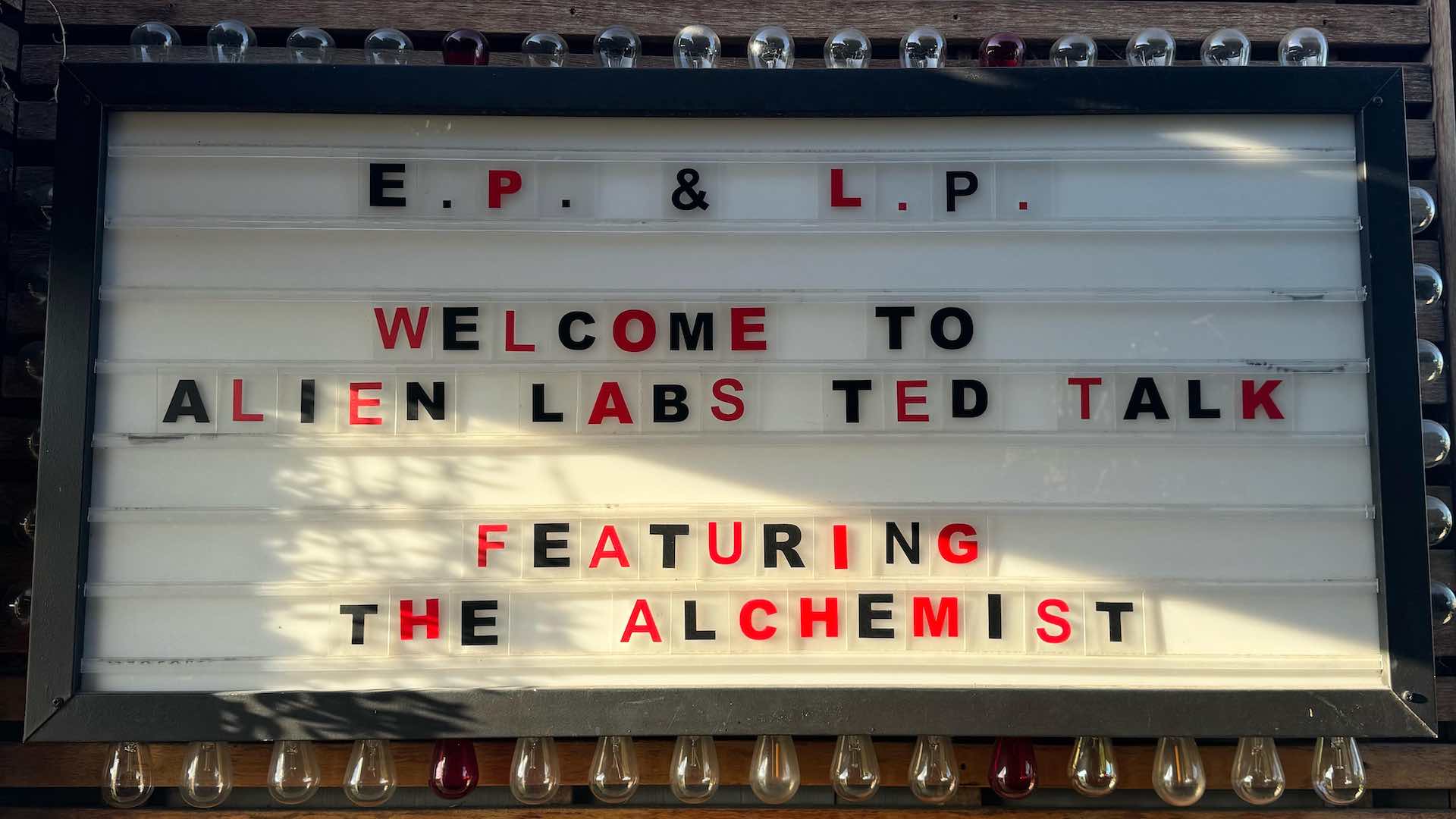Welcome to October, Stargazers! Jupiter, the most pumpkin-like planet, remains in retrograde throughout October, reminding us to slow down and focus on our growth. The spooky season requires patience as we navigate obstacles that pull us through the corn maze of life. By mid-month, Pluto goes direct in Capricorn, ushering a potent transformation in areas of power and control. This shift helps us shed old layers and embrace deeper truths, providing a sense of relief and renewed clarity in our personal and collective journeys, sweet as candy corn.
As the Sun enters Scorpio on October 23, intensity builds, attuning us to our inner world. Expect emotions to run high during the full moon in Aries on October 17—this fiery lunation stirs up passion, motivation, and a drive for independence. You may hear some howling at night, too. Channel this energy into creative projects or personal goals, without flying off the handle of your broomstick. A solid strain pairing will keep you centered as we battle our inner ghouls and goblins with calm and intention as Scorpio season looms on the horizon.
Your October horoscope
Libra

Happy Birthday, Libra! October is a pivotal month for Libra, beginning with a solar eclipse in your sign. This rare and powerful event harkens change in your personal life and appearance. It’s an ideal time for rethinking how you present yourself to the world via personal style and goals. The eclipse’s energy pulls you towards new version of yourself, one that better reflects your true aspirations and values.
As Pluto goes direct in Capricorn and your fourth house of home and family, you see decisions about your living situation or familial relationships with a new eye, fostering deeper connections or perhaps resolving longstanding issues. Jupiter continuing its retrograde in your sixth house of health and work, calls for reassessing your daily routines and work habits.
The full moon in Aries illuminates your seventh house of partnerships, highlighting the dynamics within your close relationships. This lunar event is full of potential in business or personal relationships, putting your signature balance affinity to work. As the Sun moves into Scorpio, shifting focus to your second house of finances and self-worth, you’re encouraged to delve deeper into managing your resources wisely and boosting your financial security. This time calls for a strategic approach to both personal and material growth.
October strain: You’re off the charts this month Libra, firing on all house cylinders. October is all about finding balance in pursuit of a much-needed sense of stability, and Sugar Tarts is the perfect match for your vibe this month. With its sweet terps and relaxing effects, this strain will help you unwind and reflect while you build deeper connections in your relationships and focus on personal growth. As you embrace this peaceful and introspective energy, Sugar Tarts will keep you in harmony and open to new possibilities.
Sponsored Message
20% off King Palm rolls, wraps & cones
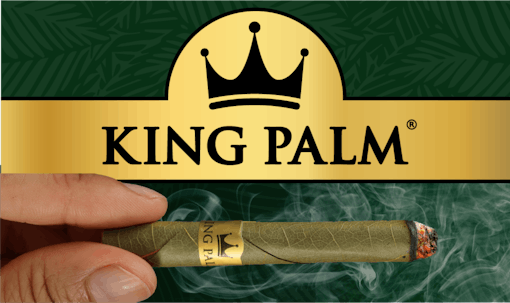
Embrace the coming season of change and celebrate the end of summer with a dope deal from King Palm. They’re offering deep discounts on their entire inventory of essential cannabis companions, including premium palm rolls, goji wraps, and hemp cones. Click the link below to save 20%.
*Discount applies to all products except The Hotbox, custom rolls, and previously discounted items.
Scorpio

For Scorpio, October brings deep internal and external transformations. The Libra solar eclipse casts a shadow over your twelfth house, the realm of the subconscious, endings, and hidden matters. This stir ups the cauldron with secrets or unresolved issues, prompting some potion-making for past lingering in the background. Introspection and release set the stage for rebirth. The movement of Pluto in Capricorn revitalizes your third house of communication with direct and challenging dialogues. This shift might help you to speak more openly about changes you want to make, especially with siblings or close community members.
Shop highly rated dispensaries near you
Showing you dispensaries near
Jupiter continues its retrograde journey through your fifth house of creativity, romance, and children, which might cause you to rethink what brings you joy and how you express your unique self. This introspective phase could reignite past hobbies or romantic feelings, blending wisdom from the past with your present experiences. The full moon in Aries illuminates your sixth house of health and work, bringing a critical turning point in your work-life balance and the routines that manage it.
This could manifest as a culmination of a work project or a shift in your health practices. As the Sun enters Scorpio later in the month, marking your solar return, a surge of personal power and clarity arrives. This is your season to shine, set personal goals, and assert your needs, embracing a new personal year with strength and confidence.
October strain: Scorpio, October is your time to embrace transformation and intense self-discovery. You always think big, but Runtz is here to help you navigate it with clarity. As Venus amplifies your desire for deep, meaningful connections, Runtz’s balanced, uplifting effects will keep you grounded while heightening your intuition. Digging into emotional truths or plotting your next big move both benefit from Runtz and its power to help you relax and focus while following your powerful instincts.
Sagittarius

Costumes and parties and vibe shifts abound for Sagittarius this month, starting with a Libra solar eclipse in your eleventh house of friendships and social networks. This celestial event might trigger changes in your social circle, engaging new community projects or social causes. Reconsider your long-term goals and the people who align with your vision, even if it means new alliances or the departure from comfortable groups. Pluto turning direct in Capricorn invigorates your second house of finances and self-worth, empowering you to take decisive steps towards securing your financial future and redefining what you value most in your life.
As Jupiter, your ruling planet, continues its retrograde journey through your fourth house of home and family, your personal foundations like home and family demand assessment. The full moon in Aries lights up your fifth house of romance and creativity, bringing passion and a climax to creative projects or romantic relationships. This lunar event gives you all the license to express yourself boldly and honor your need for joy and self-expression. With the Sun entering Scorpio and your twelfth house towards the end of the month, focus shifts towards introspection, spiritual growth, and preparation for renewal—tie up loose ends and clear the way for new beginnings!
Related
Watch: Wiz Khalifa world record joint-smoking attempt
October strain: Hey Sagittarius! October is all about transformation and adventure for you—just like Dante’s Inferno strain. As you explore new horizons in love and career, this bold hybrid will fuel your drive with its creative energy and calming effects. Whether you need deep introspection or a little spontaneous fun, Dante’s Inferno is your perfect match for a month of personal growth and magnetic connections.
Capricorn

October marks a period of significant personal and professional development for Capricorn. The Libra solar eclipse impacts your tenth house of career and public image, presenting new opportunities for your current path and professional goals. This could lead to a pivotal shift in your career trajectory that aligns more closely with your values. Pluto, your ruling planet, turns direct in your sign catalyzing a renewed sense of power and clarity. This movement enhances your personal transformation to assert your authority and make impactful decisions that reflect your true self.
Jupiter continues its retrograde in your third house of communication, prompting you to revisit conversations and ideas in language projects or strategies. This review process reaps deeper insights and improved communication tactics. The full moon in Aries illuminates your fourth house of home and family, bringing emotional matters to a head.
This lunar event underlines the need for balance between your professional and personal life. As the Sun enters Scorpio later in the month, your eleventh house of friendships and long-term goals comes into focus, encouraging you to connect with like-minded individuals. This is a time for networking and strengthening community ties to further your personal and professional objectives.
October strain: Hey Capricorn! October is all about deep transformation and focus, andSuperglue is your perfect companion for this reflective journey. As Pluto pushes you to rethink your path and organize your thoughts, the calming, sticky embrace of Superglue will help you stay grounded while enhancing your productivity. Whether you’re recharging solo or diving into an ambitious project, this strain complements the introspection and steady progress you’re making this month.
Aquarius

Significant shifts and self-discovery lie ahead for Aquarius this month. The Libra solar eclipse falls in your ninth house of travel, higher learning, and philosophy, sparking a desire for expansion and new experiences. This eclipse could prompt a new course of study, a long-distance journey, or sharing your ideas to a wider audience. Time for growth that challenges your previous perceptions and encourages embracing new perspectives as Pluto turns direct in Capricorn. Your twelfth house of secrets and the subconscious activates deep looks into your psyche for hidden issues or past traumas impacting your present.
As Jupiter continues its retrograde in your second house of finances and self-worth, reassessing your material resources and possibly revise your approach to money management becomes necessity. This period may highlight areas to improve or adjust to better support your long-term security. The full moon in Aries illuminates your third house of communication, bringing a project or idea to fruition or highlighting the need for assertive and clear communication in your relationships.
This lunar event encourages you to express your thoughts boldly and resolve any ongoing debates or discussions. As the Sun moves into Scorpio later in the month, intensifying your tenth house of career and public life follow the urge for recognition and impactful contributions to your field. This transit urges you to align your professional goals with your deeper passions and values.
October strain: Hey Aquarius! October is a month of transformation and introspection, and Rainmaker is the perfect strain to accompany you on this reflective journey. As Pluto pushes you to embrace change and shed old habits, the balanced effects of Rainmaker will spark your creativity while helping you stay grounded. Whether you’re navigating new career opportunities or recharging in solitude, this strain will keep you calm and focused.
Pisces

A Libra solar eclipse kicks October off for Pisces with a surge to your eighth house of intimacy, shared resources, and transformation. This eclipse may prompt changes in both shared finances and closest relationships. so keep a balanced approach to handling both the material and emotional aspects of these unions. Additionally, Pluto going direct in Capricorn impacts your eleventh house of friendships and future goals. You might experience a shift in your social circle or find renewed determination to pursue long-held dreams with a more strategic and empowered approach.
Jupiter continues its retrograde in your sign, urging a deep personal reflection about identity and life direction. This introspective period can be profoundly transformative, allowing you to realign your personal goals with your true self. The full moon in Aries lights up your second house of finances and self-worth, possibly bringing a financial matter to a head or prompting you to assert your needs in terms of resources and personal boundaries.
As the Sun enters Scorpio and your ninth house of travel, higher learning, and belief systems, your focus shifts towards expanding your horizons. This might involve exploring new educational paths, engaging with foreign cultures, or publishing your work. The latter part of October is about broadening your understanding and reaching for new experiences that foster growth and wisdom.
October strain: We know you love nostalgia Pisces. October brings deep emotions and the perfect cozy atmosphere for reflection with a strain like Fall ‘97. Just like the introspective energies surging this month, Fall ‘97 offers a balanced high that grounds you while sparking creativity—perfect for those moments when you’re reflecting on relationships or diving into a new project. Embrace the change with a calm, clear mind, and let this strain guide you through both your soulful and creative journeys.
Aries

In October, Aries enters a whirlwind of cosmic activity, starting with a Libra solar eclipse. This event in your opposite sign illuminates relationships, prompting profound changes and revelations in your connections with others. As Pluto moves direct in Capricorn early in the month, scratch your independence itch and make transformative decisions, especially with career and public standing. This is a powerful time for Aries to step into leadership roles or initiate significant projects.
The latter half of the month revs up as Jupiter continues its retrograde motion, nudging you towards educational or travel plans you’ve put on ice. The full moon in Aries will shine a spotlight on your personal desires and accomplishments, fanning the flames of self-expression and urging you to assert your needs. As the Sun enters Scorpio, your focus shifts toward shared resources within your connections, challenging a balance in what you give and take in relationships. This period is about deep introspection and powerful emotional revelations, setting the stage for growth as intense as man into werewolf.
October strain: Aries, October’s all about embracing your inner creativity and making bold moves. There’s no time to go zombie mode, so the pungent aromas and zingy effects of GMO-OG are your perfect sidekick. This strain’s relaxing yet stimulating effects can help you chill out while sparking those big, innovative ideas ready to unleash from within. Whether you’re diving into personal growth or making waves at work, GMO-OG will keep you focused and grounded as you ride October’s energetic highs.
Taurus

For Taurus, October is a month of pivotal shifts and the internal reflection they require. The Libra solar eclipse at the beginning of the month casts its influence towards a reevaluation of your work-life balance through your sixth house of health and daily routines. This is an ideal time to initiate new health regimes or spruce up your work environment. The shift of Pluto going direct in Capricorn also provides the momentum for profound changes in your belief systems, thus catapulting you towards new educational or travel opportunities with a more grounded perspective.
The energy begins to bubble like cauldron as the month progresses, with Jupiter’s retrograde status calling for a review of finances and investments. This might require some financial recalibration, especially concerning debts or shared resources. The full moon in Aries mid-month highlights your twelfth house of closure and spirituality—time to let go of past burdens and embrace healing. The Sun enters Scorpio as the months draws to a close, shifting your center towards relationships.
This transit pushes you to deepen bonds and confront any underlying issues in partnerships. This period is like the balance of trick-or-treating, seeking balance between giving and receiving both emotionally and materially.
October strain: Hey Taurus, October is all about transformation, deep connection, and peeling back our layers to root out what holds us back. Banana Kush, thus, is exactly what you need to relax and recharge. As you work on building stronger bonds and embracing new opportunities, this sweet, mellow strain will help you unwind while keeping your mind clear for meaningful conversations. Whether you’re reflecting on personal growth or navigating career changes, Banana Kush’s tropical, calming vibe will keep you grounded throughout the month.
Gemini

October brings a mix of creative and contemplative energies for Gemini. The Libra solar eclipse affects your fifth house of creativity, romance, and children—just don’t try to lure any kids to your cottage with candy with the intent to eat them. You might feel inspired to start a creative project while changes swirl about in your bubbling romantic life. Meanwhile, Pluto turning direct in Capricorn facilitates a deeper understanding and communication in your relationships. This transformational energy helps you to speak your truth, potentially clearing the air in significant personal or business relationships.
As the month progresses, Jupiter continues its retrograde journey through your house of partnerships, encouraging you to reassess your expectations and agreements with others. The full moon in Aries illuminates your eleventh house of friendships and social circles, highlighting your need for freedom and independence. It’s okay to fly away from time to time to truly figure out who in your life supports your aspirations.
The Sun’s entry into Scorpio towards the end of the month shifts your focus to daily routines and health. Exorcize any poltergeists holding back your work-life balance and wellness habits. This period is about finding practical ways to implement the changes you’ve been contemplating.
October strain: Gemini, October is your time to set big plans in motion, and maybe going a little wild along the way. Your rich appetites get fed with Monkey Bread #1, a creamy, cocoa-tasting strain that liven the senses while keeping you focused. As you hone in on important decisions and personal growth, this strain’s uplifting effects will help spark those long-overdue projects. Whether you’re tackling home improvements or reflecting on life’s next steps, Monkey Bread #1 keeps you ready to take action.
Cancer

October offers a profound period of self-reflection and recalibration for Cancer, starting with the Libra solar eclipse impacting your fourth house of home and family. This celestial event may bring about unexpected changes regarding your living situation or family dynamics that appear as quickly as a bat flies out of a cave. It’s a powerful time to embrace new beginnings in these areas however you can. Additionally, with Pluto going direct in Capricorn, finances are on your side, particularly regarding investments, debts, or shared resources.
Jupiter continues its retrograde motion through your house of health and daily routines, pushing you to reassess your work habits and health routines. This period calls for a careful review to ensure your daily practices support your overall well-being. The full moon in Aries activates your tenth house of career and public image, spotlighting your professional achievements and possibly bringing a project or job role to fruition.
As the Sun shifts into Scorpio later in the month, your focus turns towards romance, creativity, and self-expression. This transition encourages deeper emotional connections and may inspire you to pursue or rejuvenate creative hobbies. October is a month to balance home life with professional ambitions, ensuring neither is neglected.
October strain: Hey Cancer, October is all about emotional highs, personal growth, and finding balance in your relationships—you’re ready to pop off. Ergo, Gastro Pop is the perfect companion for this transformative time. As you navigate through introspective moments and exciting career opportunities, this strain’s calming effects can help ground your energy while without sacrificing creativity.
Leo

October promises a dynamic mix of professional and personal developments for Leo. The Libra solar eclipse impacts your third house of communication, ideas, and local travel. This means new learning opportunities or significant interactions with siblings or neighbors. This event could also prompt you to express your thoughts more openly, like a banshee, or embark on short, transformative journeys. Additionally, Pluto turning direct in Capricorn empowers your sixth house of health and work, providing a surge of energy to overhaul daily routines and work habits.
As Jupiter continues its retrograde path, it encourages introspection regarding your romantic life or creative projects. Turn this spark into re-evaluation of your pleasure sources and unique talents, possibly revisiting past hobbies or passions that were put aside. The full moon in Aries brings a new leaf to your ninth house of higher learning and travel.
With the Sun moving into Scorpio later in the month, attention turns toward your home and family life, urging you to tinker with connections with loved ones and perhaps address any underlying issues. This period is about balancing your thirst for knowledge and exploration with nurturing your roots and personal life.
October strain: We know you love to say yes, Leo, so say “sure” to Sherbanger as your October strain companion. With exciting social connections and career opportunities headed your way, Sherbanger’s uplifting and euphoric effects will keep you at the top of your game. Its creamy, fruity flavors don’t hurt, either. Whether you’re deepening relationships or chasing new goals, this strain’s balanced vibe will help you stay focused and charismatic all month long.
Virgo

October brings significant financial and personal revelations for Virgo, marked by a series of powerful cosmic events. The Libra solar eclipse illuminates your second house of finances and values, urging you to rethink income and financial strategies. This could lead to new professional beginnings stemming from a need for balance and fairness in your financial dealings. Pluto moving direct in Capricorn, pumping passion into your fifth house of creativity and romance. This could mean deepening relationships or reviving creative projects that are deeply meaningful to you.
Jupiter continues its retrograde motion through your fourth house of home and family, prompting a reconsideration of your living situation or family relationships. It’s a time for internal review, embracing adjustments at home can support your broader life goals. The full moon in Aries activates your eighth house of shared resources, intimacy, and transformation, bringing emotional and financial issues to a climax.
As the Sun enters Scorpio later in the month, your focus shifts to communication, learning, and maybe a short trip. This period is about balancing the material with the emotional, ensuring you manage both for your overall growth and stability.
October strain: Virgo, October is all about introspection and strategic growth. You need to stay on top of life’s curveballs, and Capital Haze will keep you sharp while you plan your next move. As you navigate this month of self-reflection and career refinement the uplifting focus of Haze effects will keep you focused and energized. Whether you’re reassessing relationships or setting long-term goals, this strain keeps it clear and calm.








